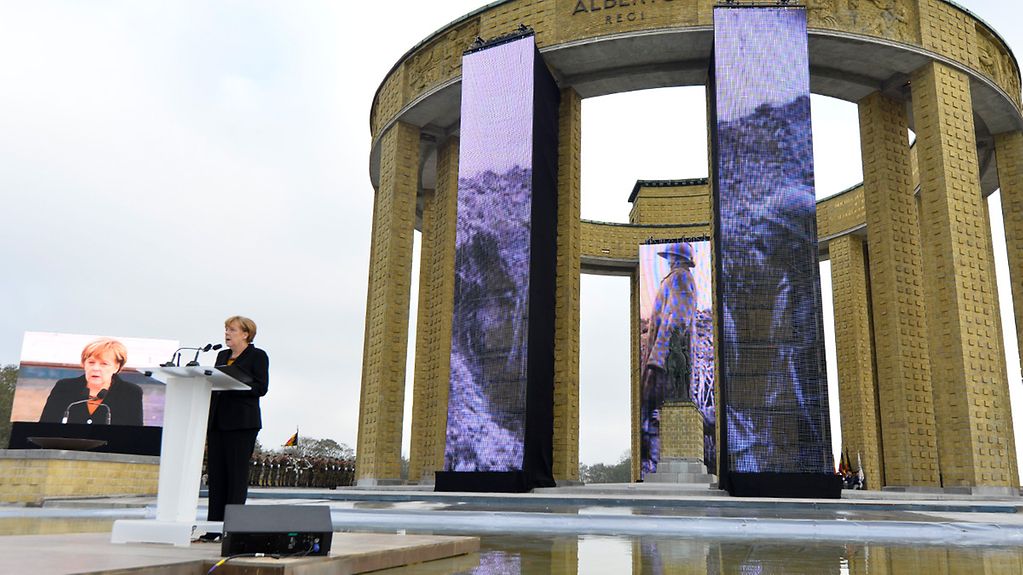World war remembrance in Belgium
At the national remembrance celebrations in Belgium, Chancellor Angela Merkel spoke of the incredible suffering of the country during the First World War. The Chancellor expressed her respect for the Belgians and thanked them for the friendship they have since built.

After the suffering caused by two world wars, we must defend the achievements of civilisation worldwide, says Chancellor
Photo: FÖD Kanzlei des Premierministers
She considered it "a special honour" to be invited, said Angela Merkel. It is "not something I take for granted" considering the "suffering that Germany brought to Belgium in two world wars, beginning with the invasion of Belgium in 1914 by the German Reich."
The Belgian royal couple King Philippe and Queen Mathilde invited the Chancellor to attend the remembrance ceremony with them at the King Albert I Memorial in Nieuwpoort to mark the centenary of the Battle of the Yser. In his address, King Philippe said, "When canons roar in other parts of the world too, we must take up the torch passed down to us by our forefathers – the torch of justice, dignity and peace."
1914 – soulless military logic
In her speech the Chancellor attacked the "soulless military logic" prevalent at the start of the war. The standards of civilisation were suddenly no longer valid, she said. "Nationalism clouded the senses." Under King Albert I, Belgium resisted and managed to stop the advance of the German army by flooding the fields of Flanders at Nieuwpoort.
The first ever use of chemical weapons by German troops in 1915 in the Second Battle of Ypres "passed a new threshold of barbarism" said Angela Merkel. These attacks left in their wake "despair, fear and speechlessness".
During the first half of the twentieth century, western Flanders was the battlefield in two world wars. In both 1914 and 1940 it was largely occupied by German troops and suffered terribly. Troops from more than 80 nations acted out their gruesome trench warfare above all on Belgium territory. Historically the 28 October 1914 is taken to mark the end of the war of movement. On this day King Albert I gave the order to flood wide areas of the Yser plain to halt the German advance. That was the start of the Battle of the Yser, which spawned the First Battle of Ypres a few kilometres further south. Four years of trench warfare in Flanders followed.
2014 – Europe stands together
In view of these horrifying events, "we cannot be grateful enough that so much has changed since," stressed Angela Merkel. With gratitude she noted that, "Belgians were some of the first to reach out to their German neighbours in a spirit of reconciliation, after the Second World War which Germany had unleashed." The friendship which has developed since between Belgium and Germany is unparalleled, she said.
It is good that the Belgian capital, Brussels, is today the seat of the European Union, because it "stands for liberty, democratic values and the preservation of international law". The Chancellor called for these achievements of civilisation to be valued, preserved, and protected around the world. "We owe that to the victims of these terrible wars. It is the only way we can adequately honour their sacrifice."
After laying a wreath, the Belgian King and Queen travelled on to Ypres with their guests of state. In Ypres, at the Menin Gate Memorial, Belgian Prime Minister Charles Michel gave a speech.
The heads of state and government of the EU also dedicated the meeting of the European Council in summer 2014 to the memory of all those who lost their lives in the First World War. President of the European Council Herman Van Rompuy had invited the heads of state and government to Ypres. Representatives of more than 80 states were invited to Liège on 4 August 2014 where they commemorated the outbreak of the First World War. Federal President Joachim Gauck represented the Federal Republic of Germany.
Ypres offers an interactive in Flanders Fields Museum, housed in the rebuilt old Cloth Hall (Lakenhalle). Photographs, films and historical objects, models and exhibits are used to bring to life the way soldiers lived and died on the western front, and to give visitors a genuine impression of the destruction and reconstruction of the region of Westhoek in western Flanders.